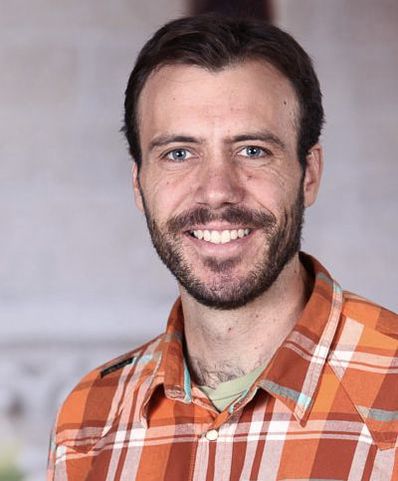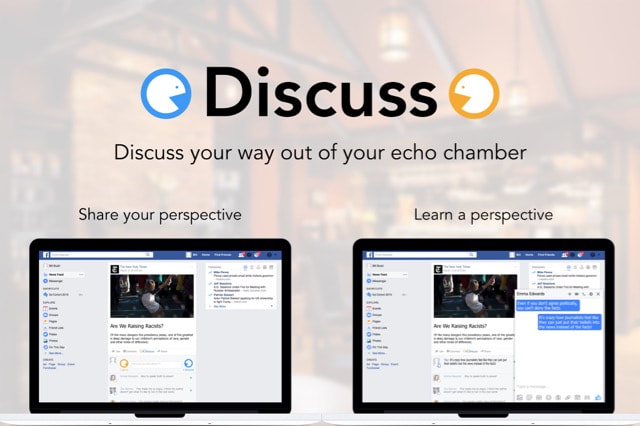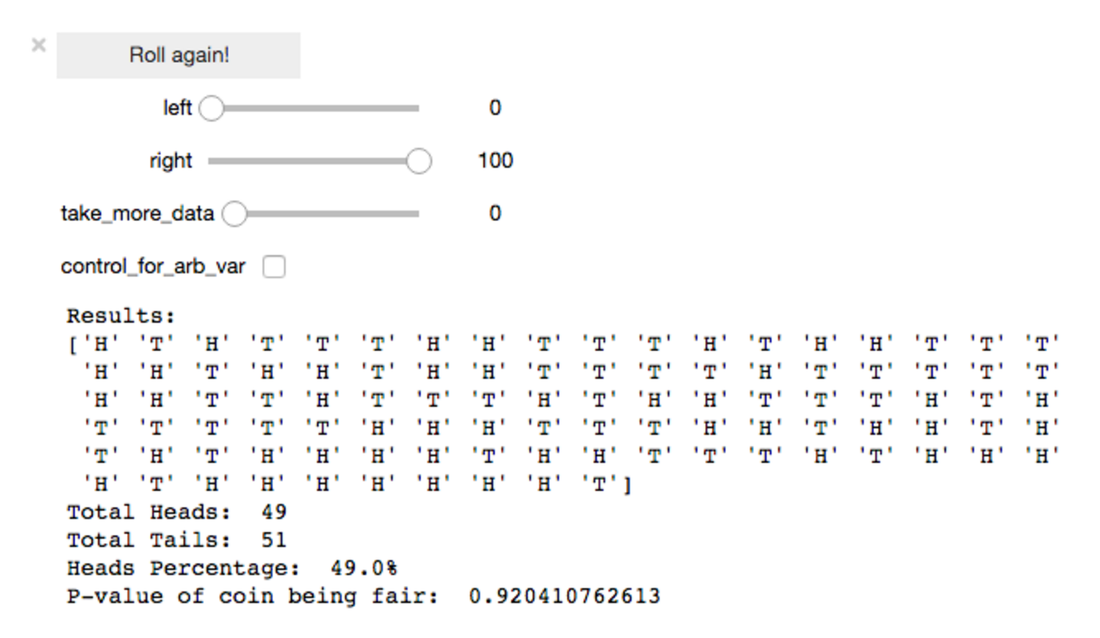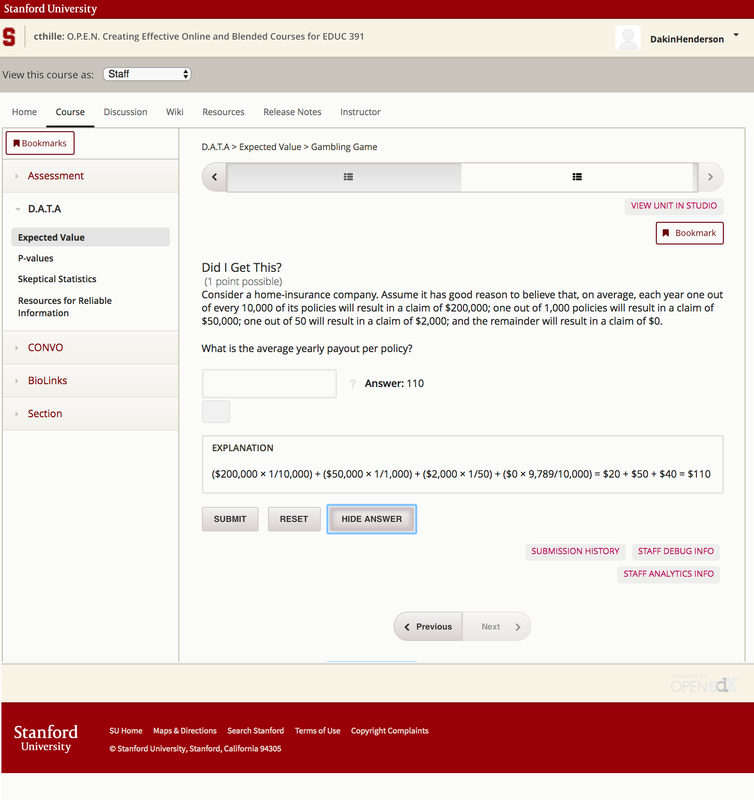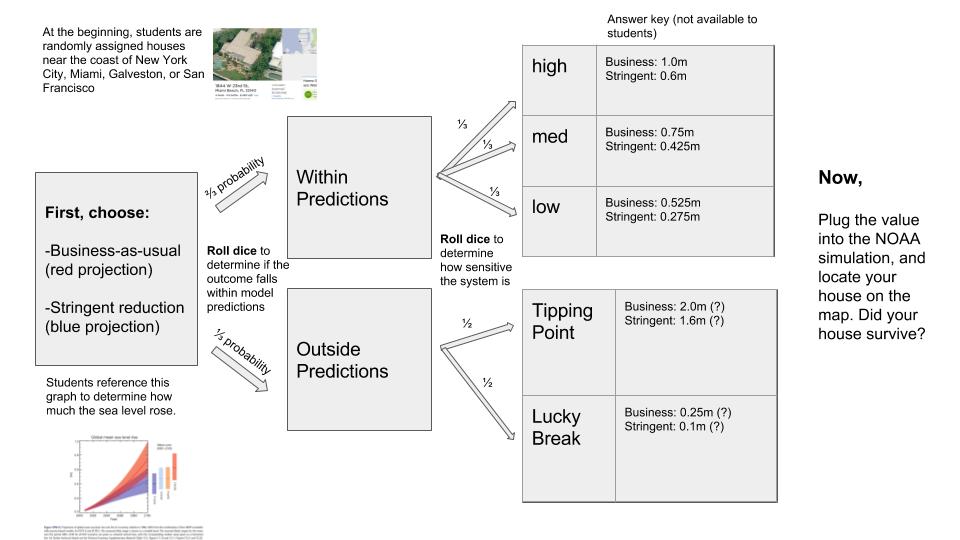learners are my audience
|
I came to the LDT program because I seek greater confidence in the efficacy of media I produce to create change inside a viewer’s mind. My audience, I realized, is composed of learners, not people sitting on their couches watching TV. I believe there is great potential for making video more interactive through integration with technology and game design.
At LDT, I have broadened my creative digital experience to include Instructional Design, Design Thinking and Human-Computer Interaction. I have supplemented my existing skills in media production with a solid foundation in educational theory and the design of learning experiences. In LDT, I created and wrote classroom lesson plans on topics ranging from climate change to newtonian physics. I collaborated with software engineers to design interactive games that simulate statistical concepts like expected value and p-hacking. My master’s project, Belief Map, is an online tool for visually informing, expressing, and deconstructing one’s belief. Throughout these projects, I remain passionate about drawing upon educational theory and research to inform my design decisions. |
Projects
Belief Map
My master's project -- collaboration with Adam Franklin
If you haven't encountered them before, please keep in mind that the prototype above is not a fully functioning web application. The idea is to mock the experience a user would have. The user flow we designed is: 1) select a topic, 2) click on the chart to plot your initial opinion, 3) write a brief statement explaining your position, 4) click on the "sources" tab on the left, 5) select a source and read/watch it, 6) click the "place" button at the bottom to activate the chart, 7) click on the chart to plot your interpretation of the source, 8) repeat steps 5-7 for all six sources, 9) click on the "conversation" tab at the top to schedule a video chat with another user, 10) follow the discussion guide during your video chat, and 11) debrief as a class with a discussion led by the teacher.
|
As antagonism, misinformation, and siloing proliferates on the internet, young people need the skills of critical thinking and argumentation now more than ever. Belief Map is an interactive tool that helps students deconstruct their own beliefs and learn to understand and challenge the beliefs of others without attacking them. Students express their beliefs graphically by marking a position on a claim represented by a 2-dimensional plot. They evaluate sources of information relevant to that claim, and update their belief in light of the evidence. Finally, a discussion protocol and reflection activity guides students through engaging with people who hold different views.
Download the full report |
|
Discuss
Class project for CS 247: Human Computer Interaction with Michael Bernstein
DIY P-hacking
Class project for EDUC 391: Engineering Online Learning
My group designed an online curriculum to teach students in EDUC200A how to assess education research they might encounter in their future careers. We defined the target learners as education practitioners who are consumers of education research, rather than statistics experts. We aimed to motivate students and encourage a sense of learner belonging and self-efficacy by transforming the traditional mathematical presentation of statistics to one centered around intuition. Our project incorporated interactive games (below, left), as well as text, multiple choice and generative questions in an OpenEdX platform (below, right).
|
Coin Flipping Game
How can you manipulate data to convince someone of something that isn't true? We designed a game that simulates coin flips. By manipulating the variables in the game, users try their hands at a technique called p-hacking (p-hacking is a blatant form of research fraud. Instances of such explicit manipulation of data are rare. However, subtler and unintentional versions of p-hacking can occur more frequently, which you will learn about in the next section). The objective of the game is to achieve a p-value of less than 0.05. |
Forward Motion
Class project for EDUC 208B: Curriculum Construction with Denise Pope
Forward Motion is a 3rd Grade science curriculum created for Roses In Concrete, a charter school in Oakland, CA. The curriculum integrates the school's social justice mission with NGSS-aligned lessons about forces, gravity, and motion.
Download the full report
Forward Motion is a 3rd Grade science curriculum created for Roses In Concrete, a charter school in Oakland, CA. The curriculum integrates the school's social justice mission with NGSS-aligned lessons about forces, gravity, and motion.
Download the full report
Internships
FOSS
I produced a series of 3 lessons for the FOSS 6th grade curriculum, Weather and Water, about climate science in the news and the climate change "debate."
(1) The first session, Evaluating Science Reporting in the News, gives students some basic skills to evaluate the credibility of media stories about science. The lesson incorporates the KQED Learning video, 4 Tips To Spot Bad Science Reporting. Students bring in science articles they have found in the news, and evaluate them using a newly-developed rubric inspired by the KQED video. This session begins to address a goal that FOSS has been deliberating over for some time: preparing students to handle the proliferation of misinformation on the internet and social media.
(2) The second session, Climate Change, Probabilities and Sea Level Rise, frames the projections of climate change in terms of probabilities. What does it mean when scientists say something is “likely” to occur? Students engage in an activity where they determine under which scenarios a waterfront property will flood. Using the IPCC projections of sea level rise (“likely” scenarios) as a reference, students roll dice to determine outcomes, and then locate their property on the NOAA simulation of sea level rise. This session addresses the need for lessons that communicate the nature of science in terms of probabilities rather than absolute truths.
(1) The first session, Evaluating Science Reporting in the News, gives students some basic skills to evaluate the credibility of media stories about science. The lesson incorporates the KQED Learning video, 4 Tips To Spot Bad Science Reporting. Students bring in science articles they have found in the news, and evaluate them using a newly-developed rubric inspired by the KQED video. This session begins to address a goal that FOSS has been deliberating over for some time: preparing students to handle the proliferation of misinformation on the internet and social media.
(2) The second session, Climate Change, Probabilities and Sea Level Rise, frames the projections of climate change in terms of probabilities. What does it mean when scientists say something is “likely” to occur? Students engage in an activity where they determine under which scenarios a waterfront property will flood. Using the IPCC projections of sea level rise (“likely” scenarios) as a reference, students roll dice to determine outcomes, and then locate their property on the NOAA simulation of sea level rise. This session addresses the need for lessons that communicate the nature of science in terms of probabilities rather than absolute truths.
(3) The third session, The Climate Change Controversy in the Media, looks at how the media deals with probability language. How accurately does the media represent the likelihoods determined by science? Students bring in articles about climate change they have found in the news, and evaluate their use of probability language using a rubric developed in collaboration with the Woods Institute for the Environment at Stanford. This session integrates the content from (1) and (2) in a meaningful way that students can apply immediately, particularly in the time of increasing politicization of climate change science.
METRICS
I am performing a needs assessment for METRICS, the Meta-Research Innovation Center at Stanford, for developing educational material to promote reproducible research. I am examining and categorizing existing material, interviewing experts in the field, and identifying areas of need.
Essays
Why Should Scientific Results Be Reproducible?
Article in NOVA Next
www.pbs.org/wgbh/nova/next/body/reproducibility-explainer/
Article in NOVA Next
www.pbs.org/wgbh/nova/next/body/reproducibility-explainer/
Science ≠ Knowledge: Ending Binary Thinking Around the Reproducibility Crisis
Final Paper for EDUC 348: Policy & Practice in Science Education, taught by Jonathan Osborne
Download the paper
Final Paper for EDUC 348: Policy & Practice in Science Education, taught by Jonathan Osborne
Download the paper
The Evaluative Nature of Science: How Do We Balance Trust With Skepticism?
Final Paper for EDUC 357: Science & Environmental Education in Informal Contexts, taught by Nicole Ardoin
Download the paper
Final Paper for EDUC 357: Science & Environmental Education in Informal Contexts, taught by Nicole Ardoin
Download the paper
Making Meaning: The Role of Bias in Pursuit of Truth
Paper for EDUC 180: Directed Reading with Jonathan Osborne
Download the paper
Paper for EDUC 180: Directed Reading with Jonathan Osborne
Download the paper
Mansplaining and Transmissive Pedagogy
Paper for EDUC 208B: Curriculum Construction with Denise Pope
Download the paper
Paper for EDUC 208B: Curriculum Construction with Denise Pope
Download the paper
The Farm-Wilderness Distinction
Paper for EDUC 357: Science & Environmental Education in Informal Contexts, taught by Nicole Ardoin
Download the paper
Paper for EDUC 357: Science & Environmental Education in Informal Contexts, taught by Nicole Ardoin
Download the paper
Reaction to Merchants of Doubt
Paper for EDUC 357: Science & Environmental Education in Informal Contexts, taught by Nicole Ardoin
Download the paper
Paper for EDUC 357: Science & Environmental Education in Informal Contexts, taught by Nicole Ardoin
Download the paper
Education and Activism: Interview With Larry Adelman
Paper for EDUC 357: Science & Environmental Education in Informal Contexts, taught by Nicole Ardoin
Download the paper
Paper for EDUC 357: Science & Environmental Education in Informal Contexts, taught by Nicole Ardoin
Download the paper
The Content and Context Balance
Paper for EDUC 208B: Curriculum Construction with Denise Pope
Download the paper
Paper for EDUC 208B: Curriculum Construction with Denise Pope
Download the paper
FOSS Engineering: A Curriculum Critique
Paper for EDUC 208B: Curriculum Construction with Denise Pope
Download the paper
Paper for EDUC 208B: Curriculum Construction with Denise Pope
Download the paper
